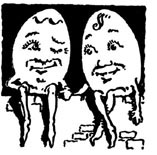
Miracles for Empiricists
EASTER EGG HUNTING
Count Charles of Flanders was murdered in church in the year 1127. At the moment of his murder, Charles was fasting for Lent, on his knees in prayer, and pausing his prayers only to give alms to the poor. The saintly symbolism wasn’t lost on anyone. The nobles who killed him tried to calm the situation by getting his body out of the city of Bruges, but they waited too long. By the time their soldiers arrived at the Church of St. Donatian, a crowd of angry citizens was already there.
The soldiers grabbed the stretcher to carry Charles’s body out, but the citizens hung on to keep it where it was. It became a tug of war, everyone pulling and staggering around the church, even going through the area where the poor and the sick sat to beg.
Then something entirely unexpected happened.
One of the beggars in the church had been born with malformed legs. Since he couldn’t get out of the way in time, he ducked under the stretcher. When the body of Blessed Charles passed over his head, the beggar’s legs were healed. He jumped up and began to praise God.
The miracle changed things. The soldiers let go of the stretcher and slunk away. Blessed Charles stayed where he was.
I tell this story in my account of Charles the Good as part of my Manly Saints Project, an online exploration of saints who exemplify manly virtues and could be good role models for young men today. By now, I’ve read about hundreds of miracles, sifting through the various tales, trying to maintain a reasonable intellectual and emotional distance.
You May Also Enjoy
Lewis, as a man, a scholar, and a writer, recognizes the perennial threat of dehumanization, including the misuse of science.
One of the most remarkable aspects of JACK is the reader's sense of having a trustworthy guide who knows the terrain.
The devil sees shepherds "withholding essential nourishment" from their flocks as "a delightful thing to behold."

